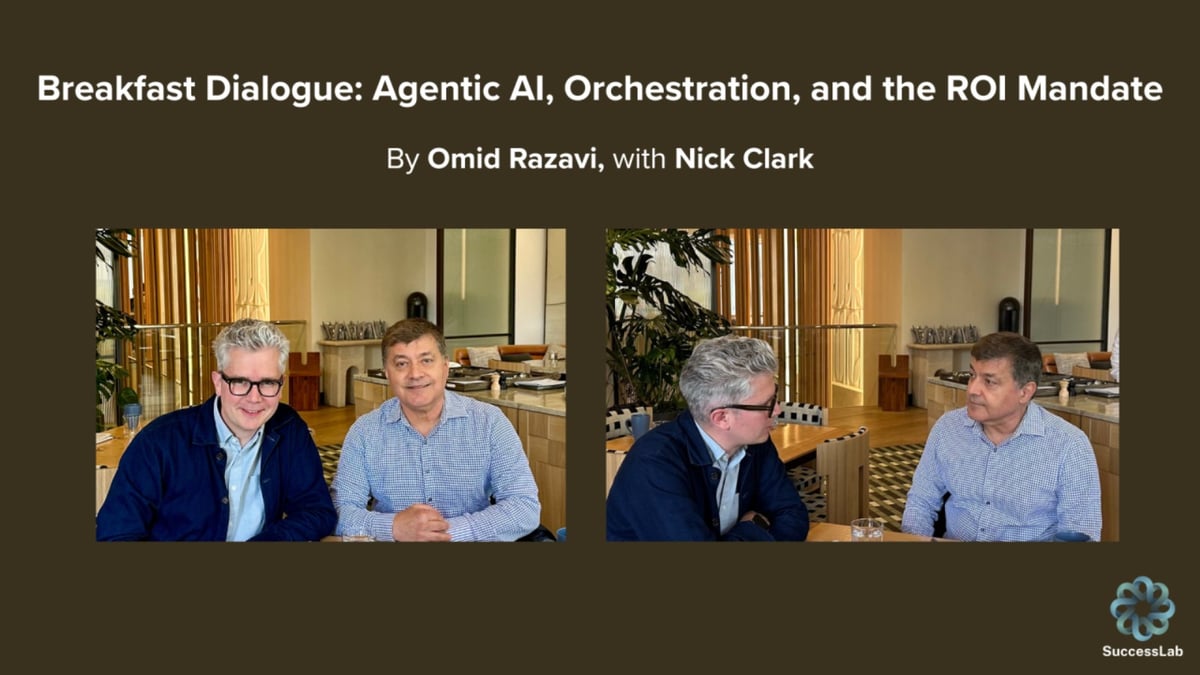Breakfast Dialogue: Agentic AI Orchestration and the ROI Mandate

Omid Razavi
May 28, 2025
San Francisco, May 23, 2025 – The fog hung low over the Embarcadero as I made my way to The Jay Hotel, a modern and quietly elegant spot tucked just off the San Francisco waterfront. At 7:58 AM sharp, I met with Nick Clark, Partner at Boston Consulting Group (BCG), for what turned out to be a focused and thought-provoking 30-minute strategy breakfast.
Nick had just completed a West Coast study tour with a financial services client, visiting leading AI vendors such as Salesforce, Amazon Web Services (AWS), Observe.AI, Cresta, and Kore.ai. Their goal: to understand how to put AI to work in customer service and support and where it’s really adding value.
Over tea (Nick), coffee (me), and omelettes (both), we talked through the state of AI in customer service and support (CSS), the critical importance of orchestration and context, and what organizations must do to scale AI responsibly and effectively.
We also finalized plans for our upcoming CSS Executive Forum in London on June 18th, 2025, graciously hosted at BCG’s London venue. The theme: “AI ROI Rescue.” The name says it all: companies need more than pilots and productivity stats. Boards want proof of value.
From Autonomy to Orchestration: Rethinking Agentic AI
In the media, AI is often portrayed as fully autonomous, tools that can think and act on their own. However, in practice, companies are building intelligent systems that augment humans, rather than replace them.
Nick shared a model he had outlined earlier that morning in his blog A View from the Valley, describing how companies build networks of specialized AI agents. Each agent is responsible for a specific function and is “owned” by a different team. Here are a few examples:
- A Personalized Offer Agent (Product) generates tailored offers using AI.
- A Knowledge Agent (Support) ensures those offers are accurate and compliant.
- A Service-to-Sales Agent (Support) guides the human rep on delivering the offer.
- A Compliance Agent (Legal) ensures everything aligns with policy.
This approach is less about replacing roles and more about enhancing cross-functional execution. But to support hundreds or thousands of such agents, companies need enterprise-grade AI platforms. Think back to the orchestrators of the Robotic Process Automation (RPA) era. The same kind of governance applies here with more flexibility and intelligence.
Why Context is the Real Intelligence Behind AI
Our conversation turned to one of my favorite topics: contextual intelligence. It may sound like a buzzword, but it’s the difference between automation and proper assistance.
AI is only as effective as the context it’s given. That includes:
- Who the customer is
- What they’ve done before
- What they’re trying to solve now
This context is dynamic, constantly evolving during a conversation. And much of it isn’t neatly structured in a CRM; it lives in documents, chats, meeting notes, and employee memory.
Companies getting the most from AI invest in the systems and processes to harness and structure this context. Without it, AI is just glorified scripting. With it, AI becomes meaningful and empathetic.
What Separates the AI Product Leaders: Model Performance + UX
Nick Clark noted that although many AI vendors appear to offer similar capabilities on the surface, two key factors set them apart:
- Model Performance: This includes accuracy, speed (latency), tone-of-voice adaptability, multilingual support, and how well their large language models (LLMs) are fine-tuned for specific industry or customer service tasks.
- User Experience (UX): Beyond having a powerful model, what matters is how easy it is for non-technical teams to actually use it. The vendors that stand out are those that make it simple to design, deploy, manage, and improve AI agents through intuitive interfaces, visual workflow builders, and centralized oversight tools.
Nick highlighted Cresta for its standout UX. I’ve always appreciated SupportLogic’s UX; customers praised it during my time as CCO, and I still hear the same today.
“A smart AI model gets your attention, but great UX keeps your team using it, and that’s what truly drives value at scale.”
Emerging Roles for the AI-Powered Service Team
Our conversation shifted to new roles and skills, as well as the impact of low-code and no-code platforms. Companies no longer need armies of PhDs (though I’ll admit I still proudly hold my engineering one, even if it gathers dust).
They need a new kind of service leader who can design, integrate, and manage AI workflows across teams. Nick articulated four roles that are becoming essential in AI-first support organizations:
- Strategic Service Designer – Decides where and how AI should be applied.
- Solution Architect – Connects AI agents with systems like CRM, ERP, and data lakes.
- Workflow Designer – Reimagines processes to include both humans and AI.
- Prompt Engineer – Writes clear instructions for AI agents, including tone and guardrails.
These roles should already be appearing in job postings. If you're building a future-ready team or considering your next career move, now is the time to start building the skills these roles require. I’ll explore them in more detail in a separate article.
AI ROI: Beyond Efficiency to Real Value
Our final topic is the one we’ll explore at the London forum: How do you measure ROI from AI in customer support?
Traditional metrics, such as reduced handle time and higher deflection rates, still matter, but they’re no longer enough. Boards are asking tougher, more strategic questions, and AI investments now need to demonstrate broader business impact.
At the London forum, we’ll dig into three key pillars of AI ROI:
- Revenue Enablement – AI that drives renewals, upsells, and conversions
- Customer Experience – AI that improves CSAT and NPS through personalization
- Operational Scalability – AI that reduces burnout and enables flexible, efficient growth
“AI ROI Rescue” is a fitting title, courtesy of Stuart McCann of BCG. Too many AI initiatives fall short not because the technology doesn’t work, but because the business value isn’t communicated effectively.
Join Us in London – June 18th, 2025
If you’ll be in or near London, we’d love to have you at the CSS Executive Forum on June 18th. We’re gathering 40 senior leaders from across the UK and Europe for candid conversations about what AI is truly delivering in customer service—and where the real value lies (and doesn’t).
Next Stop: Dublin – June 24th, 2025
After London, we’re heading to Dublin, Ireland, for a CX Roundtable and Dinner on June 24th, hosted with my good friend and trailblazing CSS innovator, Declan Ivory, VP of Support at Intercom.
Final Thought
Nick and I explored the critical shifts reshaping customer service and support in these thirty minutes. One thing is clear: AI is no longer a future to prepare for; it’s a present to shape. The challenge is making it work at scale, with purpose, context, and measurable outcomes.
If that’s a conversation you want to help lead, join us in London or Dublin.
Let’s build the future of customer service—together.
About the author: Omid Razavi is the founder of SuccessLab and a global advocate for Customer Success, Service, and Support leadership. He has led executive forums and workshops across North America, Europe, and Asia, helping organizations align AI innovation with post-sales strategy and organizational design. Through SuccessLab and as host of the CCO Online and CSS Next virtual forums, he amplifies the voice of post-sales leaders, shaping strategic narratives and championing their critical role in driving customer value and long-term growth.
Like
Comments (0)
Popular

